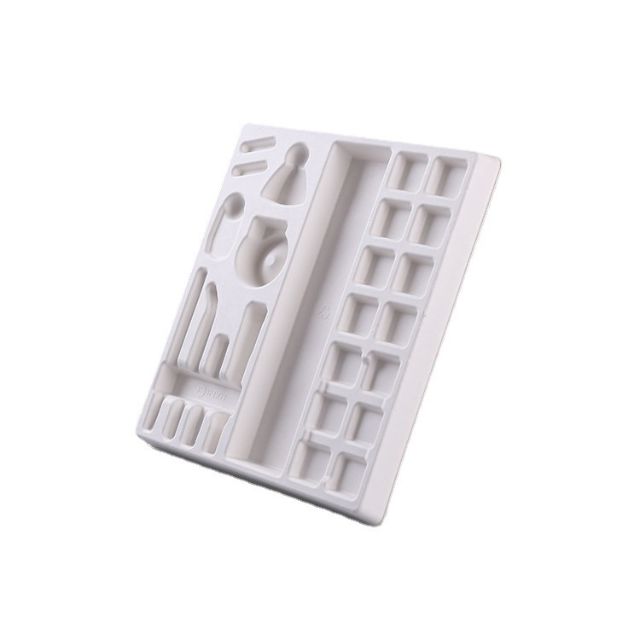Views: 106 Author: Site Editor Publish Time: 2025-08-21 Origin: Site









For decades, the medical packaging industry has been dominated by a familiar cast of materials: rigid plastics, blister packs, and thermoformed clamshells. Although this reliance on petroleum-based polymers is excellent in providing protection and sterility, it has led to a growing sustainability concern. Single-use packaging accounts for a sizable amount of the millions of tons of plastic trash produced by hospitals each year. However, a quiet revolution is brewing, one that is as ancient as paper yet as modern as molecular science. Custom pulp compositions are revolutionizing medical packaging by providing a potent combination of unmatched eco-credentials and superior protection.
The shift is driven by a powerful convergence of pressures. Regulatory bodies and patients are increasingly demanding greener practices, while hospitals and device manufacturers are seeking to reduce their environmental footprint without compromising on safety or cost. Traditional molded pulp, often associated with egg cartons, was never a viable candidate for the stringent requirements of medical devices. It was inconsistent, lacked structural integrity for heavy items, and could not meet critical sterility barriers.
This is where the concept of custom pulp formulations changes everything. Instead of a one-size-fits-all approach, engineers and material scientists are now tailoring pulp mixtures at a molecular level to meet specific functional needs. The base material—typically a blend of recycled cardboard, newsprint, or virgin bamboo/or sugarcane fiber—is just the starting point. The true innovation lies in the additives and the processing.
For instance, by integrating specific binding agents, the pulp can achieve much higher tensile strength and resistance to abrasion. Water-repellent additives can be introduced to create a barrier against moisture, a crucial factor for maintaining a sterile environment. For packaging that requires transparency or specific aesthetic appeal, natural bleaching agents and smooth surface finishes are engineered into the formulation. This ability to customize allows packaging to be designed for specific devices: shock absorption for delicate surgical tools, rigid support for robotic surgery arms, or precise cushioning for diagnostic equipment.
The most significant technological leap in this space comes from advanced manufacturing techniques, most notably wet pressing molded pulp packaging. This process is a game-changer. Unlike traditional molded pulp, which is often air-dried and can result in a rough, inconsistent surface, the wet pressing method involves forming the pulp under high heat and extreme pressure. This compacts the fibers, driving out moisture and creating a product that is remarkably dense, smooth, and dimensionally precise.
The benefits of wet pressing molded pulp packaging for medical applications are profound:
Superior Surface Quality: The smooth finish minimizes dusting and particulate generation, a non-negotiable requirement for clean and sterile environments.
Enhanced Structural Integrity: The final packaging is perfect for heavy or irregularly shaped gadgets because it is sturdy, solid, and able to stack without collapsing.
Consistency and Precision: Every unit is identical, ensuring reliable performance in automated packing and sterilization lines.
Barrier Properties: The dense surface can be more effectively coated with FDA-approved bio-barriers to protect against contaminants.
This disruptive technology is not just theoretical. Forward-thinking companies are already leveraging it to create packaging that is compostable, recyclable, and even biodegradable in marine environments, all while passing the rigorous tests for sterility maintenance (ASTM D4169) and shelf life.
For medical device manufacturers looking to pioneer this shift, partnering with an innovative supplier is critical. This is where a specialist like Globepulp stands out. Globepulp, a pioneer in cutting-edge molded pulp solutions, has the know-how to create and test unique formulations suited to the requirements of a certain device. Their capability in wet pressing molded pulp packaging ensures that the final product meets the highest standards of medical-grade performance. By choosing a supplier with a strong R&D focus and a commitment to sustainability, companies can future-proof their packaging, reduce their lifecycle environmental impact, and align with the values of modern healthcare.

In conclusion, the disruption of medical packaging is not about replacing one material with another. It is about a smarter, more intentional approach to material science. Custom pulp formulations, supercharged by processes like wet pressing, are dismantling the long-held belief that sustainability requires a compromise on performance. They are proving that the most effective package can also be the most responsible one, turning a legacy of plastic waste into a future of purposeful, plant-based protection. The healthcare industry is finally healing its own environmental footprint, one custom-designed pulp package at a time.